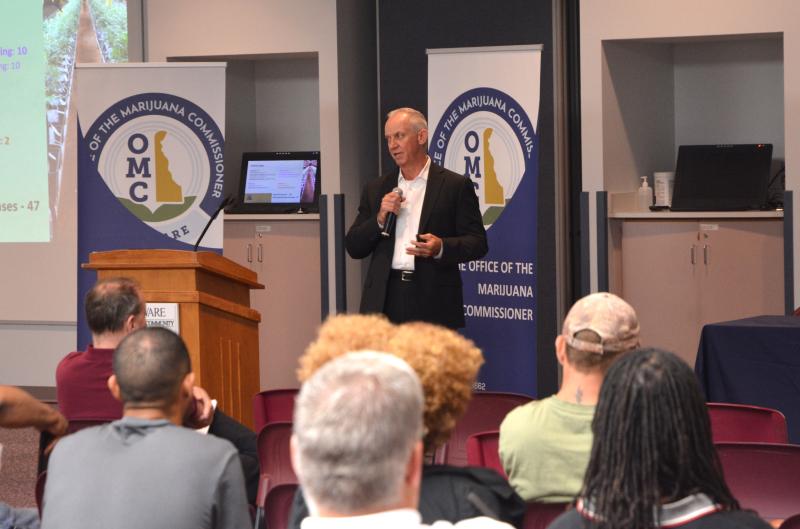Social equity licenses look to level weed field
Beginning Sept. 1, the Delaware Office of the Marijuana Commissioner will begin accepting applications from individuals interested in licenses to cultivate, manufacture, test and sell marijuana. In advance of that date, officials from the marijuana commissioner’s office are hosting workshops across the state to make sure individuals who qualify for social equity licenses are aware of them and how to best go about obtaining one.
The first workshop was in Newark, while the most recent one took place June 12 at Delaware Technical Community College in Georgetown.
OMC Commissioner Robert Coupe said the turnout was a little less than Newark the week before. But, he said, that’s to be expected because there’s a smaller pool of potential applicants.
The state will award 125 licenses related to the marijuana industry in Delaware. About a quarter of those licenses will be social equity licenses, which is a program designed to create a more inclusive program by providing opportunities for individuals who have been disproportionately impacted by past marijuana laws. Marijuana was legalized in Delaware in April 2023.
Stacie Burton was on hand representing the Delaware Black Chamber of Commerce. She said she was there because the organization needed to have a better understanding of the process so they can help Black business owners through the application process. For the questions the chamber can’t answer, she said, it’s important that it can at least point people in the right direction.
“It needs to be fair for everyone, especially for minority-owned businesses,” said Burton.
Georgetown’s Joe Bailey said he got busted and went to jail for selling marijuana back in the 1990s. Now, he said, he’s interested in getting back into the industry since it’s legal.
“I’d like to set up a shop,” he said. “I’m here to just check things out and to see what kind of programs are going to be offered.”
Bailey said his marijuana-related felonies have been hanging over him since he was a teenager. It follows a person everywhere they go, he said.
“People just don’t understand. There are all kinds of problems with it,” said Bailey.
Robert Steger, who lives in Sussex County, said he’s interested in cultivation. He said he’s just recently gone through the process of getting his marijuana-related felony expunged from his record. He said he has a farm, so he’s comfortable with the idea of cultivation.
“There are differences, but it’s just switching one crop to another,” said Steger.
Also on hand was Delaware Division of Revenue Director Kathy Revel, who was there to give advice on tax-related information. There’s licensing, gross receipts and collection of retail taxes, she said of the nuances of running a business.
Shore United Bank was in attendance. It’s the first bank in Delaware willing to work with marijuana-related businesses in a depository relationship, said Stephen Wright, commercial banking vice president. It’s still illegal at the federal level, so most banks haven’t gotten into the business, but Shore United has worked out the kinks in other states, he said.
In total, between cultivation, retail, manufacturing and testing, the state will issue 125 licenses; 47 of those will be social equity licenses. A normal-priced application fee will be $3,000, while the social equity license fee will be $1,000. Social equity and microbusiness licenses cost $4,000 for two years, while the regular license is $10,000.
The OMC has a set of criteria for individuals to apply for the workshops and licenses:
• Must have resided for at least five of the preceding 15 years in a disproportionately impacted area
• Must have been convicted of or adjudicated delinquent of a marijuana-related offense under Delaware law prior to April 23, 2023, with the exception of delivery to a minor, or any offense involving a Tier 3 quantity of marijuana
• Must have had a parent, legal guardian, child, spouse or dependent who was convicted of or adjudicated delinquent for a marijuana-related offense under Delaware law prior to April 23, 2023, with the exception of delivery to a minor or any offense involving a Tier 3 quantity of marijuana.
The OMC’s website also lays out its implementation plan beyond this informational process: July – adoption of regulations to administer licensing of recreational marijuana businesses; Sept. 1 – accepting all license applications begins; Nov. 1 – issuing up to 60 cultivation facility licenses; Dec. 1 – issuing up to 30 product manufacturing licenses; March 1, 2025 – issuing up to 30 retail and five testing facility licenses.
There are two more workshops scheduled – 3 p.m., Tuesday, June 18, at the Wilmington Campus of Delaware Technical Community College, 333 N. Shipley St., Wilmington; 3 p.m., Wednesday, June 26, at Dover Public Library, 35 Loockerman Plaza, Dover.
For more information on the marijuana licensing program and the social equity licenses, go to omc.delaware.gov, email omc@delaware.gov or call 302-244-3662.
Chris Flood has been working for the Cape Gazette since early 2014. He currently covers Rehoboth Beach and Henlopen Acres, but has also covered Dewey Beach and the state government. He covers environmental stories, business stories and random stories on subjects he finds interesting, and he also writes a column called Choppin’ Wood that runs every other week. He’s a graduate of the University of Maine and the Landing School of Boat Building & Design.























































